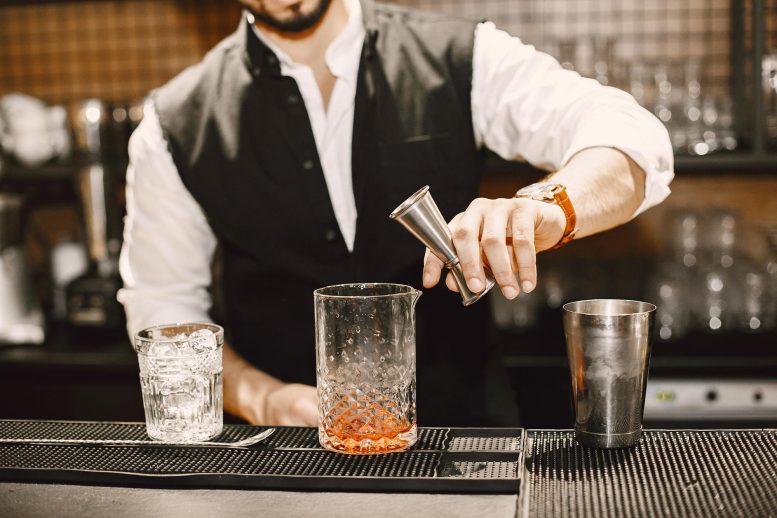
Sometimes ignorance is bliss. But blissful ignorance can bring about unnecessary suffering when it comes to drinking. Time to get your facts straight before you end up on the bathroom floor again.
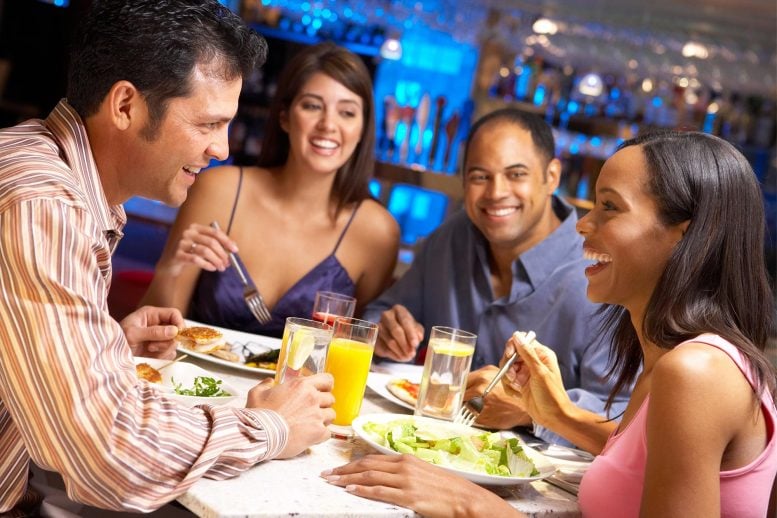
Myth #1 – Eating before drinking keeps you sober
No matter how much you eat — or whether you drink milk or yogurt in an attempt to line your stomach — all of the alcohol you consume will eventually enter your bloodstream, through your mouth (a tiny percentage via the small blood vessels in the mouth and tongue), stomach (around 20%), and small intestine (around 80%).
That said, eating before drinking has its uses. The less that’s in your stomach when you start drinking, the quicker the alcohol will enter your bloodstream, and the quicker you’ll get drunk and find yourself unable to talk coherently or stand up. Having a bite to eat before you down your first drink will delay your embarrassing inebriation and could limit your hangover. Certain foods[1] are better than others (and they don’t include lots of greasy things, which can cause acid reflux and make you feel worse).
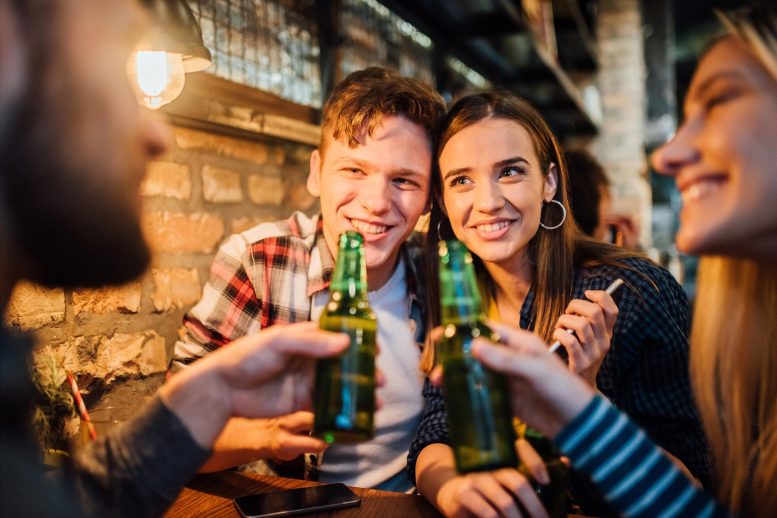
Myth #2 – Beer before liquor, never sicker; liquor before beer, you’re in the clear
The fact is, too much alcohol will make anyone feel sick, and there’s no good evidence that having liquor before beer will make you feel better. That said, some research[2] has been done into this by the universities of Manchester and Lancashire. The researchers asked a small group of people — 12 men, nine women — to drink vodka, a mixture of vodka and water, and a mixture of vodka and carbonated water during three separate sessions, and then measured how quickly their bodies absorbed the alcohol. They found that alcohol diluted with plain water was absorbed faster than more concentrated shots, but that carbonated water seemed to slow the absorption rate down for the majority of their test subjects. In other words, it should take your body longer to absorb a 12-ounce glass of beer than a shot of liquor.
As far as the saying is concerned, if you drink beer and follow it with hard liquor, you start with a weakly alcoholic drink before adding the concentrated alcohol and end up with a mixed, carbonated drink in your stomach. This mixture is not absorbed that quickly, making you feel like you’re still quite sober and encouraging you to drink more. If, on the other hand, you start drinking liquor, it rapidly gets into your bloodstream and makes you feel drunker, quicker, which may decrease your subsequent consumption of beer.
When all is said and done, how much you drink and how fast you drink it will determine how you end up feeling, not the order in which you down your drinks.
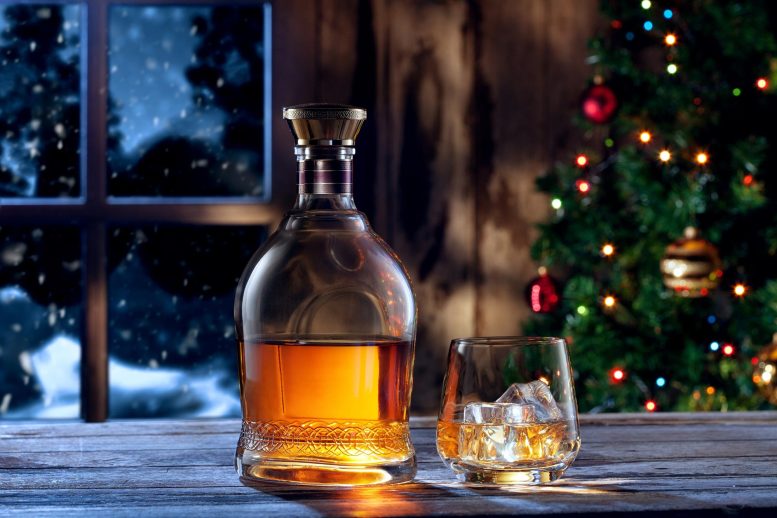
Myth #3 – Alcohol keeps you warm
No, it doesn’t.[3] Alcohol acts as a vasodilator, which means that it causes your blood vessels to dilate, notably the capillaries near your skin, filling them with blood and making you look slightly flushed. While this may initially make you feel warmer, your body is doing this to promote heat loss by bringing your blood closer to your surface so that it can cool down. The initial warmth caused by this extra blood flow toward your skin may also make you sweat, cooling you down even further. On top of that, your core temperature will drop quite quickly, and you won’t notice it because your skin will probably still feel fairly warm, which makes it even more dangerous to drink alcohol in cold weather.
While we’re on this particular myth, this is also why the idea that the giant Swiss St. Bernard alpine rescue dogs used to carry around miniature barrels of alcohol for the people they rescued is also a myth.[4] It was created by the English painter Edwin Landseer who, in 1820, when he was just 17 years old, produced his most famous work, “Alpine Mastiffs Reanimating a Distressed Traveler,” in which he randomly painted a small barrel hanging around the neck of one of the hero mastiffs and claimed it was brandy.
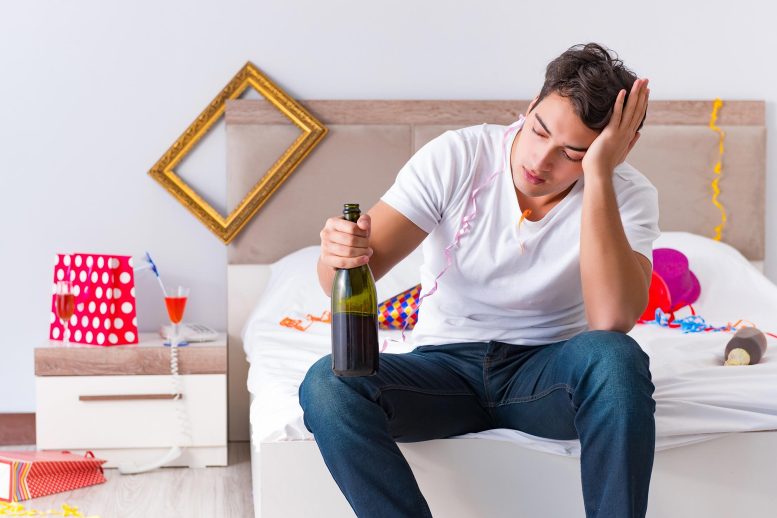
Myth #4 – Hair of the Dog Cures a Hangover
The expression “Hair of the dog” is shortened from the more eloquent “Hair of the dog that bit you” and originates with the Medieval Europeans who believed that sometimes the cause of what ails you can also be its cure.[5] In the case of drinking, it’s an excuse to drink more so you can try to avoid a hangover. But it won’t work. It will trigger your brain to release feel-good neurotransmitters like endorphins and dopamine, which may help to mask your feelings of discomfort and make your body stop processing the previous night’s alcohol — which is what makes you feel bad[6] — so that it can digest the next lot. But you’re just delaying the inevitable. Sooner or later, you’ll have to endure the headache, nausea, and general dreadfulness that is the hangover. You’d probably be better off drinking lots of water and taking aspirin.
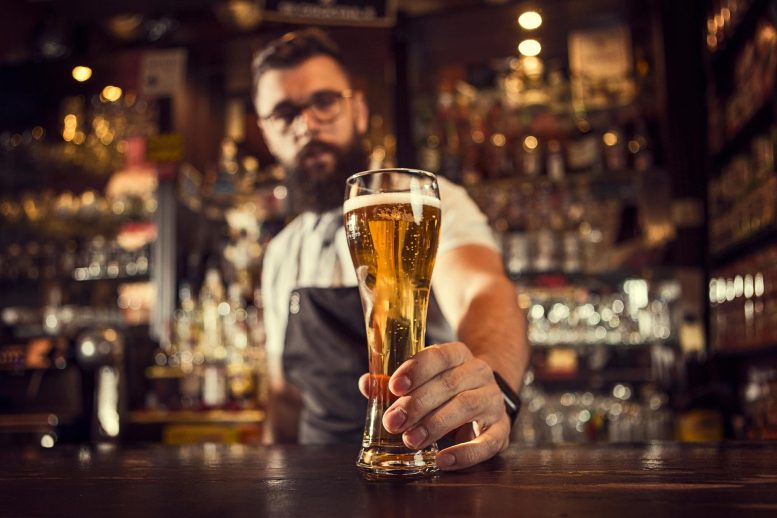
Myth #5 – Beer has less alcohol than hard liquor so it will make me less drunk
Unfortunately, this theory does not add up unless you take all of your alcohol in a shot glass.[7] A 12-ounce bottle of regular beer (5% by volume) has as much alcohol in it as a 5-ounce glass of wine (12% alcohol by volume) or a 1.5-ounce shot of regular liquor (40% by volume). What tends to happen is that people drain their shot glasses quicker than they would drain their beer glasses, so they end up drinking more. Additionally, beer and wine take more time to work their way through a person’s system, so, if you have one shot of vodka, you will feel drunker than if you have a glass of beer or wine, but they eventually will make you equally drunk.
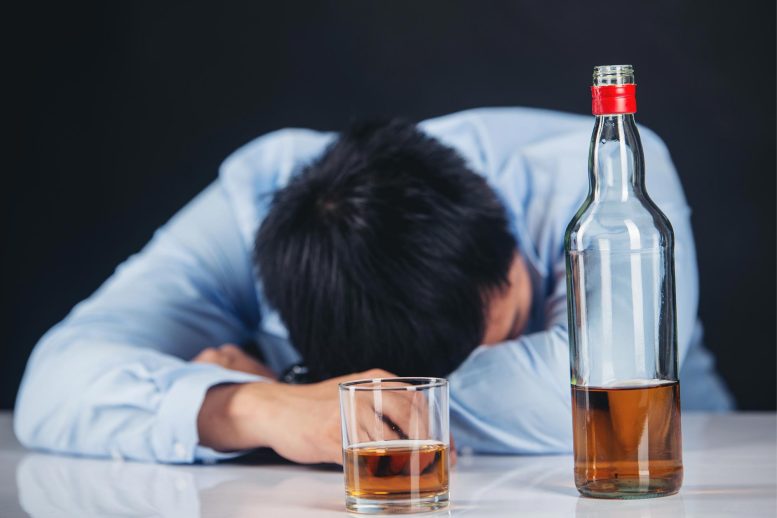
Myth #6 – Alcohol is a stimulant
Alcohol may initially seem stimulating, but it’s ultimately a depressant[8] — it slows down your body and brain. How much depends on your tolerance for alcohol and the amount you drink. When you first drink, you feel stimulated because a lower dose of alcohol loosens you up and triggers your brain to release “happy hormones,” which stimulate and energize you. Alcohol can also increase your heart rate and makes some people more aggressive, which is stimulant-like.
Eventually, however, alcohol decreases your heart rate and blood pressure, slows down your central nervous system, and makes you (seem) more stupid. Large amounts can make people even slower, sleepier, and more disoriented. It also suppresses dopamine production, which makes you feel sad. In ridiculously large amounts, alcohol depresses the central nervous system so much that you stop breathing, and your heartbeat stops.
Everyone is different. Some people experience more of the stimulating effects, while others experience more of the depressant effects. According to scientists,[9] the former may be more at risk for alcoholism.
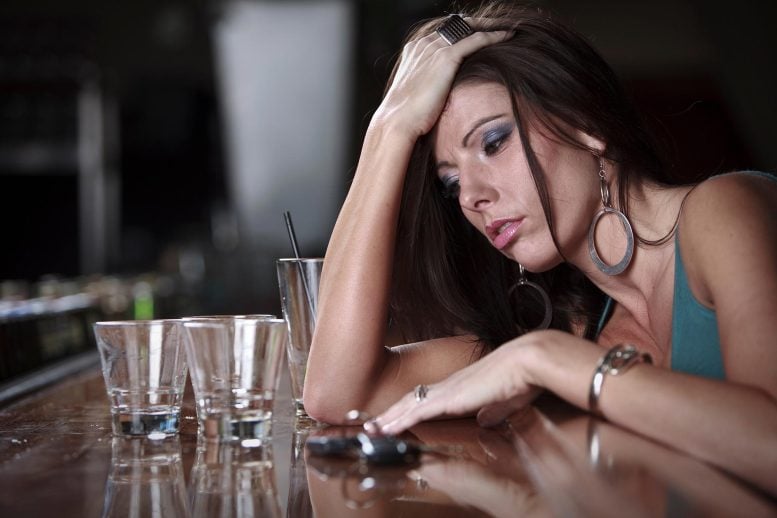
unused
Myth #7 – You can sober up quickly with a cold shower/coffee/an invigorating walk
No, you can’t. Your liver metabolizes alcohol at a fixed rate, around one ounce of liquor — equivalent to one standard drink — an hour. Nothing[10] will speed up the process — not a cold shower, or a brisk walk, or a large kebab (the alcohol’s already in your bloodstream, so it’s too late for food to have any effect). Drinking water might help you with some of your symptoms of dehydration the next day, but it won’t sober you up (and it’ll probably make you want to pee all night). Coffee doesn’t work either, even though it might seem like it does because it gives you a boost of energy. But all that will do is make you believe you are less drunk than you are and okay to drive (you’re not!). The only thing you can do is wait it out. The more you’ve drunk, the longer you’ll have to wait.
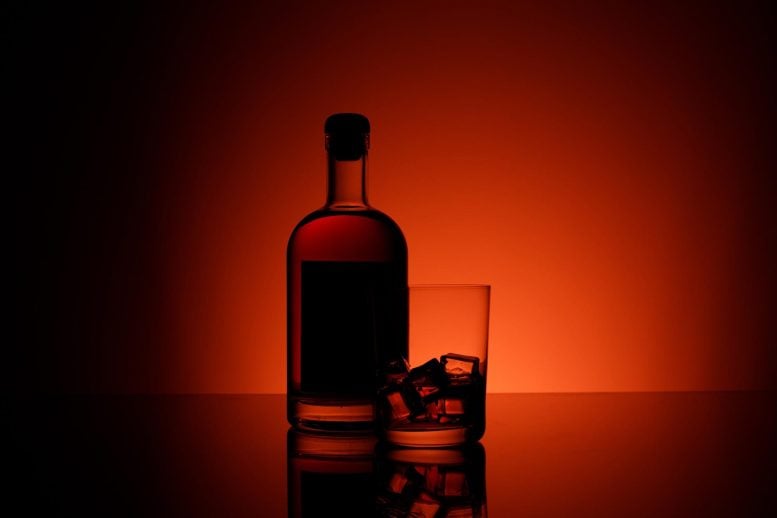
Myth #8 – A nightcap will help you sleep
Contrary to popular belief, having a drink before you go to bed will not help you sleep better. A 2013 review[11] of all the known alcohol-related studies at the time reported that, although alcohol helps you fall asleep faster and provides a deeper sleep during the first half of the night, it makes it more difficult for you to stay asleep and to sleep well, in large part because you keep waking up to go to the bathroom. You may also have problems with snoring, nightmares, headaches, and insomnia, and if you suffer from sleep apnea, the muscle-relaxing properties of the alcohol may make it even more difficult for you to keep your airway open.[12]
Just as importantly, alcohol reduces the quality and length of your REM sleep,[13] a very important stage of slumber during which you process emotions, form new memories, and integrate new skills. Not getting enough REM has been linked to various problems in the short term — including difficulty concentrating, motor-skill problems, forgetfulness, and sleepiness — and, over time, to illnesses such as depression, diabetes, obesity, and cardiovascular disease.
For the best quality of sleep, follow the three-hour rule and have your last drink at least three hours before you go to bed. For the best quality of life, have something to eat before you drink, and don’t overdo it.
References:
- byrdie.com/best-foods-eat-before-drinking-alcohol-4764157
- doi.org/10.1016/j.jflm.2006.12.010
- livescience.com/55435-does-drinking-alcohol-warm-your-body.html
- beerconnoisseur.com/articles/myth-st-bernards-and-barrels
- sciencedaily.com/releases/2017/02/170214163637.htm
- chemistryviews.org/details/ezine/1080019/Chemistry_of_a_Hangover__Alcohol_and_its_Consequences_Part_3/
- upthirst.com/does-liquor-get-you-drunk-faster-than-beer-you-asked/
- healthline.com/nutrition/is-alcohol-a-stimulant#depressant-effects-of-alcohol
- doi.org/10.1007/7854_2011_135
- wikihow.com/Sober-Up-Fast
- eurekalert.org/news-releases/909212
- doi.org/10.1016/j.sleep.2017.12.005
- sleepfoundation.org/stages-of-sleep/rem-sleep


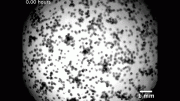
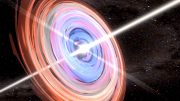
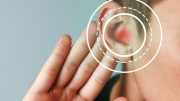
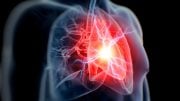
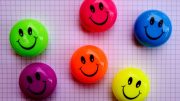
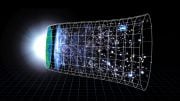

Be the first to comment on "8 Myths About Alcohol That Your Liver Will Thank You For Not Believing"